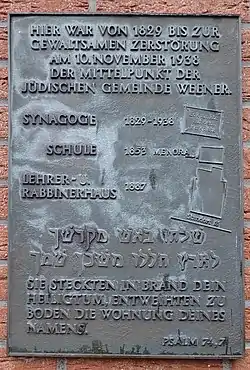Psalm 74
Psalm 74 (Greek numbering: 73) is part of the Biblical Book of Psalms. A community lament, it expresses the pleas of the Jewish community in the Babylonian captivity. In the slightly different numbering system of the Greek Septuagint version of the bible, and in its Latin translation in the Vulgate, this psalm is Psalm 73. It is attributed to Asaph.

Content
Verses 1–3 open this psalm by imploring God to recall God's people, and Mount Zion. The psalm continues in verses 4–11 by describing the destruction of the Temple by "the enemies of God".[1] Verses 12–17 praise the might of God; the psalm ends (verses 18–23) by imploring the Lord to remember Israel and come to her aid.
The enemy is not named, but may refer to King Nebuchadnezzar. According to the Targum, the reference is to Antiochus Epiphanes.[2]
Verse 1 portrays the image of the people of Israel as God's flock, "the sheep of your pasture".[3]
Uses
Judaism
- Psalm 74 is recited on the fast of the Tenth of Tevet in some traditions.[4]
- It is recited on the second day of Passover in some traditions.[4]
- Verses 2 and 12 are recited during the blessings before the Shema on the second day of Rosh Hashanah.[5]
References
- Verse 4, King James Version
- Jerusalem Bible (1966), footnote a at Psalm 74
- Verse 1, New Revised Standard Version
- The Artscroll Tehillim page 329
- The Complete Artscroll Machzor for Rosh Hashanah page 271
External links
| Wikimedia Commons has media related to Psalm 74. |